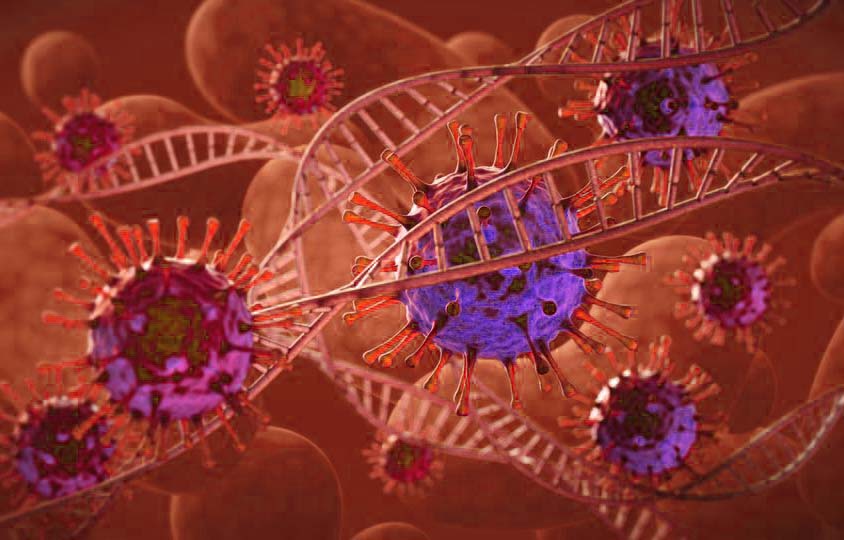Nikhil Prasad Fact checked by:Thailand Medical News Team Oct 18, 2025 3 months, 3 weeks, 6 days, 1 hour, 16 minutes ago
Medical News: Scientists from the Centre for Interdisciplinary Sciences at JIS Institute of Advanced Studies and Research in India, together with researchers from the Department of Medical Laboratory Technology at Taibah University in Saudi Arabia, have uncovered how SARS-CoV-2 doesn’t just infect cells but actually manipulates the body’s genetic expression through epigenetic changes. Their findings show that the coronavirus can “reprogram” host cells to help itself survive, reproduce, and evade immune defenses. This
Medical News report explains how these hidden genetic switches might explain why some people experience severe illness and long-term complications after infection.
 COVID-19 Alters Human Genes to Evade the Immune System
The Virus’s Genetic Hijacking Strategy
COVID-19 Alters Human Genes to Evade the Immune System
The Virus’s Genetic Hijacking Strategy
The study found that SARS-CoV-2 targets the host’s epigenome—the chemical instructions that control how genes are turned on or off. Instead of changing a person’s DNA sequence, the virus changes how certain genes behave through mechanisms like DNA methylation, histone modification, and non-coding RNA interference. These tiny alterations determine which immune pathways are activated or suppressed, directly influencing whether the infection remains mild or turns deadly.
DNA methylation, one of the key processes examined, silences vital antiviral genes and interferes with the normal immune response. The researchers found that severe COVID-19 patients show widespread “hypomethylation,” meaning that immune genes become overactive and cause dangerous inflammation, often leading to cytokine storms. In contrast, certain protective genes become “hypermethylated” and stop functioning properly, allowing the virus to multiply freely.
How Aging and Epigenetics Increase Vulnerability
The scientists also revealed that older adults are more prone to infection because of age-related changes in the methylation of the ACE2 gene, the very receptor the virus uses to enter cells. In older people, this gene becomes less methylated and thus more active, producing higher amounts of ACE2 receptors in lung tissue. The virus finds more entry points, while younger people—whose ACE2 genes remain tightly regulated—face less severe infections.
Histones and Viral Evasion
Another discovery focused on histones, the proteins around which DNA is wrapped. SARS-CoV-2 can alter histone acetylation and methylation to suppress the body’s interferon response. These epigenetic shifts make immune cells slower to detect and fight the virus. The virus even mimics certain histone proteins to block the transcription of antiviral genes, allowing it to hide from immune surveillance.
The Role of microRNAs and RNA Modifications
The team also highlighted how SARS-CoV-2 manipulates microRNAs (miRNAs)—small molecules that regulate gene expression—to suppress immunity and enhance replication. Some viral miRNAs
block host defense proteins, while others interfere with interferon signaling. The study further explored RNA methylation (m6A) on the viral genome, which helps the virus stabilize its RNA, mimic host mRNA, and escape detection.
Therapeutic Possibilities
Importantly, these findings suggest new treatment directions. Drugs that target epigenetic regulators—such as histone deacetylase inhibitors or DNA methylation modifiers—could help restore proper immune function. Similarly, identifying specific miRNAs altered during infection could lead to personalized antiviral therapies.
Conclusion
This groundbreaking research reveals that SARS-CoV-2’s success lies not only in its mutations but also in its ability to rewrite the body’s gene expression rules. By controlling how human cells read their own DNA, the virus manipulates immunity, metabolism, and inflammation. Understanding these epigenetic mechanisms could revolutionize treatment approaches for both acute COVID-19 and long COVID, potentially leading to drugs that reverse the virus’s hidden genetic fingerprints. This study demonstrates that future therapies must look beyond the virus itself and focus on how it changes the host from within.
The study findings were published in the peer-reviewed journal: Frontiers in Immunology.
https://www.frontiersin.org/journals/immunology/articles/10.3389/fimmu.2025.1596135/full
For the latest COVID-19 News, keep on logging to Thailand
Medical News.
Read Also:
https://www.thailandmedical.news/articles/coronavirus
https://www.thailandmedical.news/articles/long-covid
